The Intel Kaby Lake-X i7 7740X and i5 7640X Review: The New Single-Threaded Champion, OC to 5GHz
by Ian Cutress on July 24, 2017 8:30 AM EST- Posted in
- CPUs
- Intel
- Kaby Lake
- X299
- Basin Falls
- Kaby Lake-X
- i7-7740X
- i5-7640X
Rocket League
Hilariously simple pick-up-and-play games are great fun. I'm a massive fan of the Katamari franchise for that reason — passing start on a controller and rolling around, picking up things to get bigger, is extremely simple. Until we get a PC version of Katamari that I can benchmark, we'll focus on Rocket League.
Rocket League combines the elements of pick-up-and-play, allowing users to jump into a game with other people (or bots) to play football with cars with zero rules. The title is built on Unreal Engine 3, which is somewhat old at this point, but it allows users to run the game on super-low-end systems while still taxing the big ones. Since the release in 2015, it has sold over 5 million copies and seems to be a fixture at LANs and game shows. Users who train get very serious, playing in teams and leagues with very few settings to configure, and everyone is on the same level. Rocket League is quickly becoming one of the favored titles for e-sports tournaments, especially when e-sports contests can be viewed directly from the game interface.
Based on these factors, plus the fact that it is an extremely fun title to load and play, we set out to find the best way to benchmark it. Unfortunately for the most part automatic benchmark modes for games are few and far between. Partly because of this, but also on the basis that it is built on the Unreal 3 engine, Rocket League does not have a benchmark mode. In this case, we have to develop a consistent run and record the frame rate.
Read our initial analysis on our Rocket League benchmark on low-end graphics here.
With Rocket League, there is no benchmark mode, so we have to perform a series of automated actions, similar to a racing game having a fixed number of laps. We take the following approach: Using Fraps to record the time taken to show each frame (and the overall frame rates), we use an automation tool to set up a consistent 4v4 bot match on easy, with the system applying a series of inputs throughout the run, such as switching camera angles and driving around.
It turns out that this method is nicely indicative of a real bot match, driving up walls, boosting and even putting in the odd assist, save and/or goal, as weird as that sounds for an automated set of commands. To maintain consistency, the commands we apply are not random but time-fixed, and we also keep the map the same (Aquadome, known to be a tough map for GPUs due to water/transparency) and the car customization constant. We start recording just after a match starts, and record for 4 minutes of game time (think 5 laps of a DIRT: Rally benchmark), with average frame rates, 99th percentile and frame times all provided.
The graphics settings for Rocket League come in four broad, generic settings: Low, Medium, High and High FXAA. There are advanced settings in place for shadows and details; however, for these tests, we keep to the generic settings. For both 1920x1080 and 4K resolutions, we test at the High preset with an unlimited frame cap.
For all our results, we show the average frame rate at 1080p first. Mouse over the other graphs underneath to see 99th percentile frame rates and 'Time Under' graphs, as well as results for other resolutions. All of our benchmark results can also be found in our benchmark engine, Bench.
MSI GTX 1080 Gaming 8G Performance
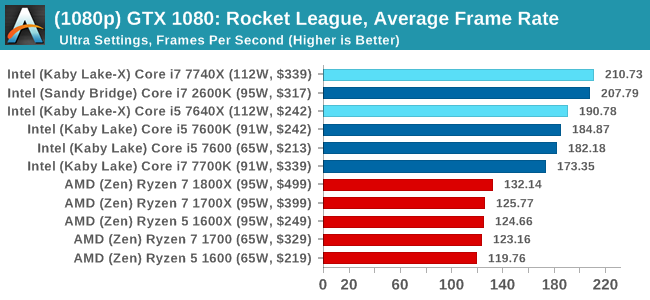
1080p

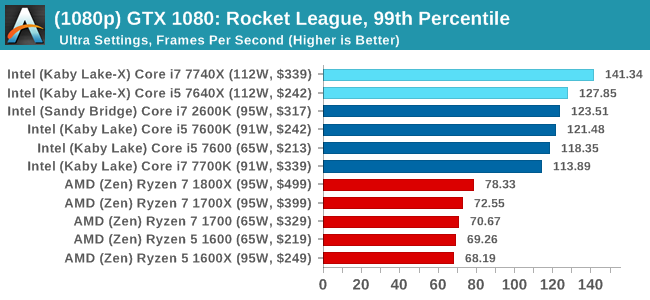
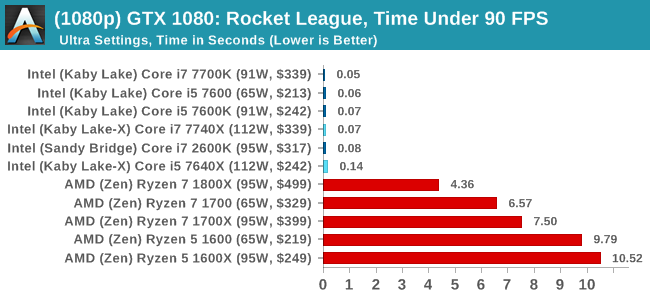
4K
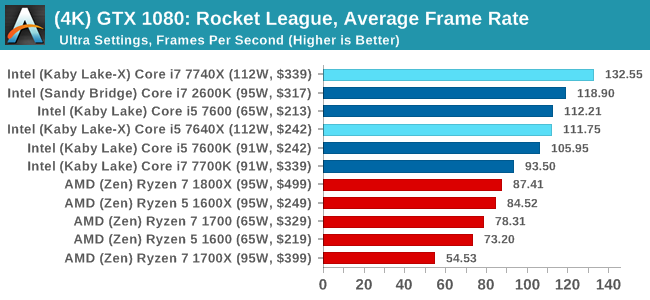
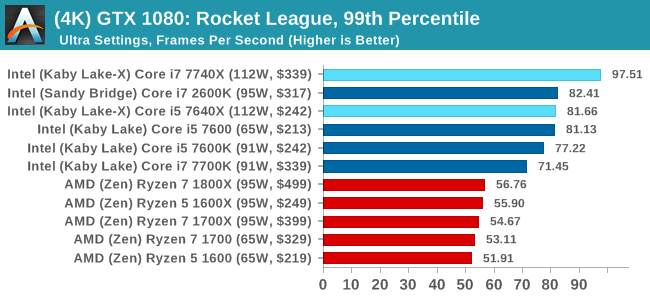
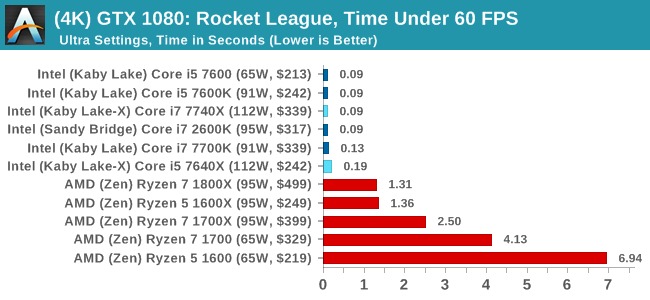
ASUS GTX 1060 Strix 6GB Performance
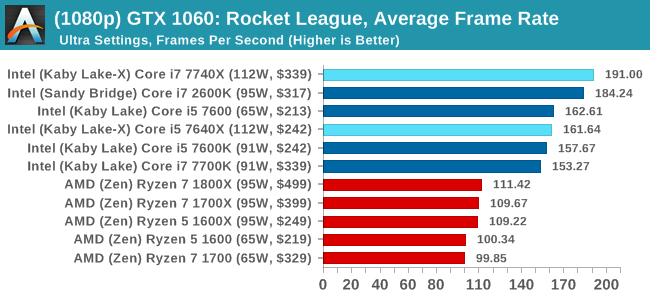
1080p

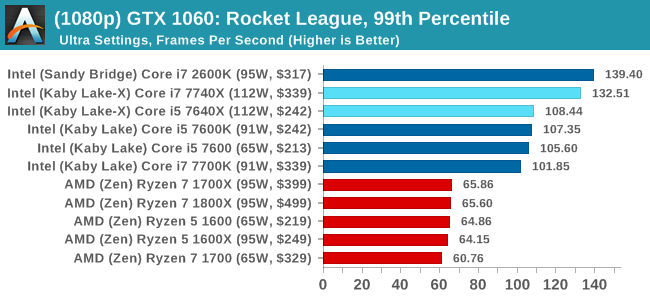
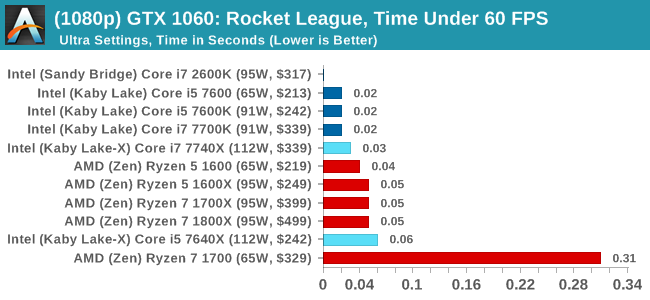
4K
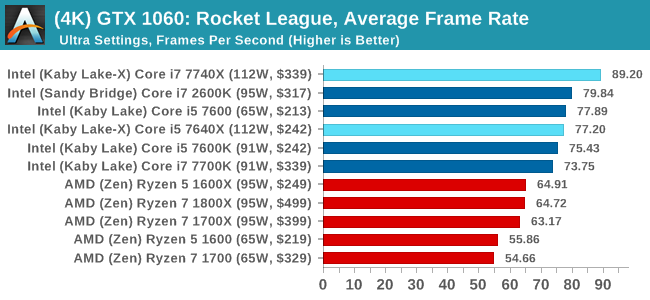
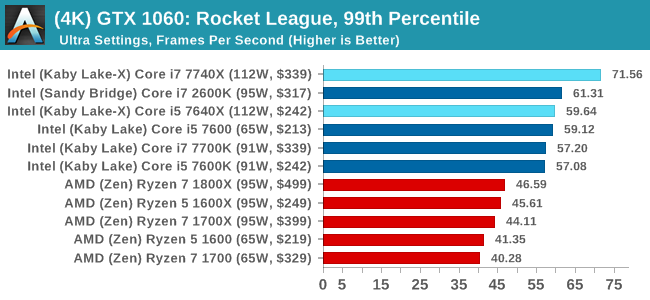
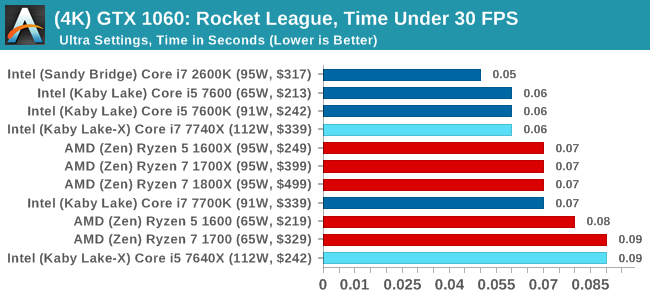
Sapphire R9 Fury 4GB Performance
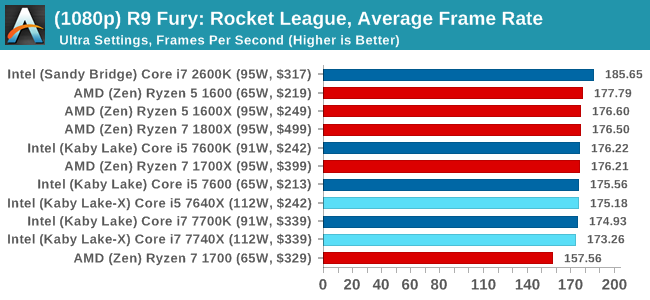
1080p

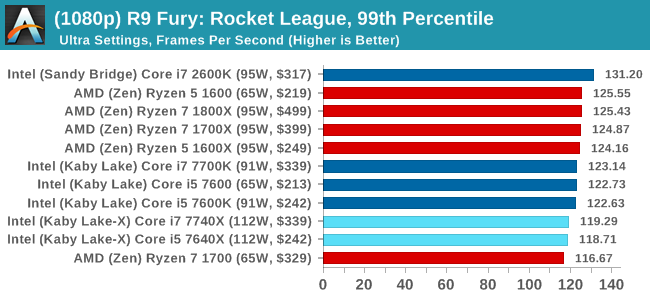
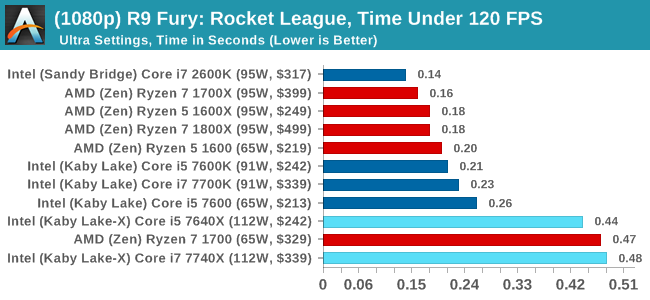
4K
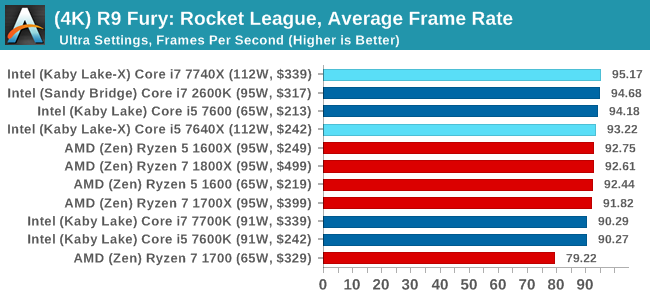
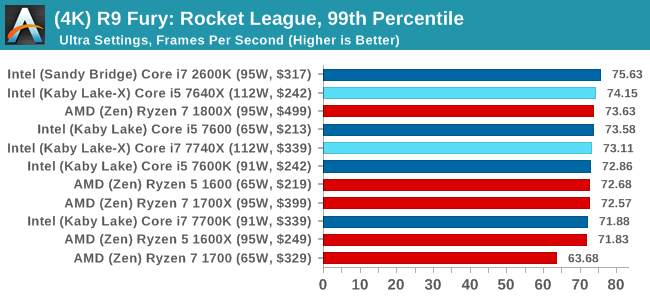
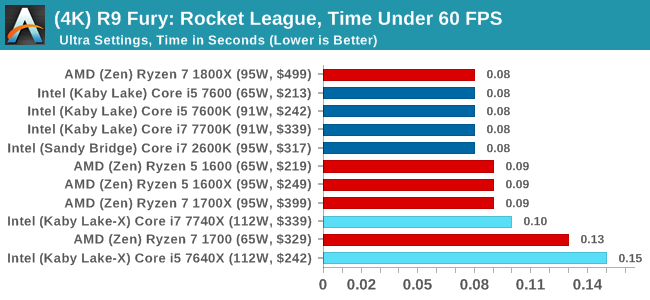
Sapphire RX 480 8GB Performance
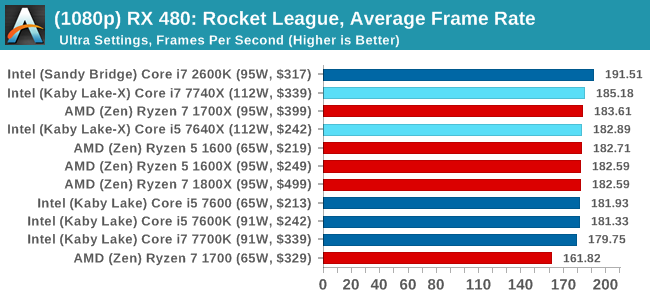
1080p

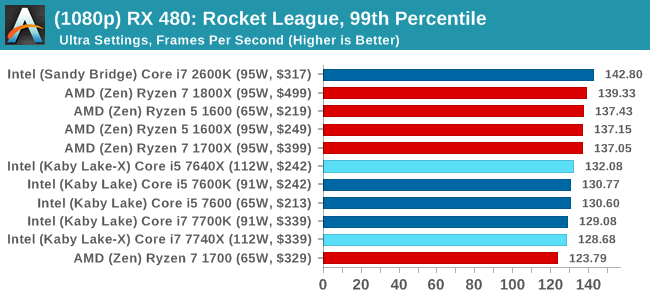
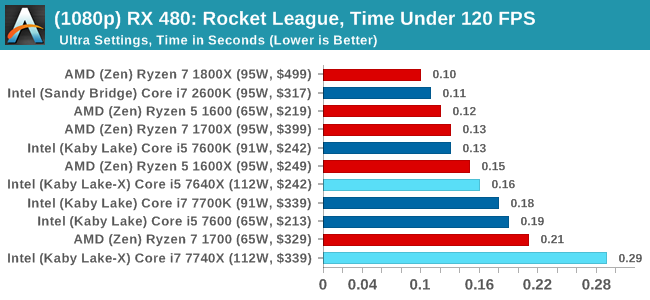
4K
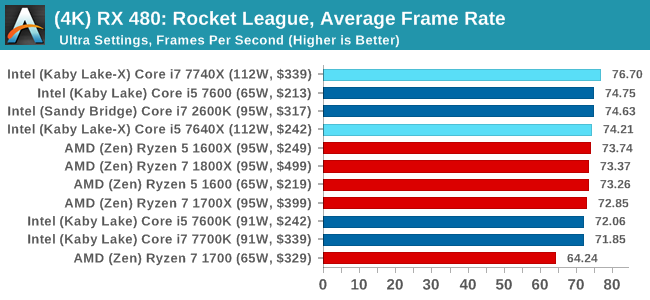
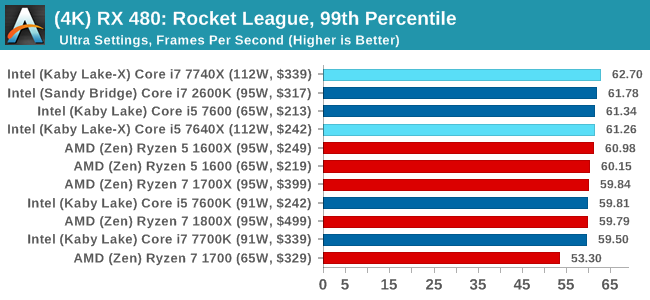
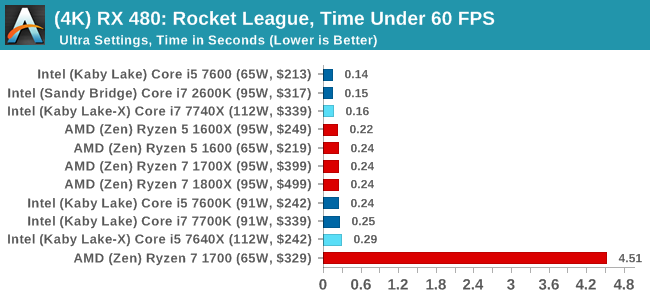
Rocket League Conclusions
The map we use in our testing, Aquadome, is known to be strenuous on a system, hence we see frame rates lower than what people expect for Rocket League - we're trying to cover the worst case scenario. But the results also show how AMD CPUs and NVIDIA GPUs do not seem to be playing ball with each other, which we've been told is likely related to drivers. The AMD GPUs work fine here regardless of resolution, and both AMD and Intel CPUs get in the mix.


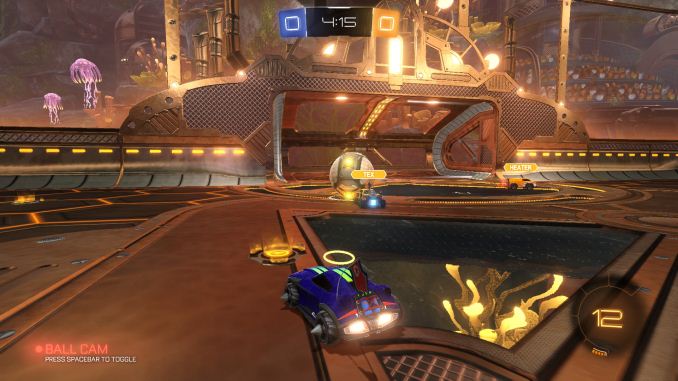
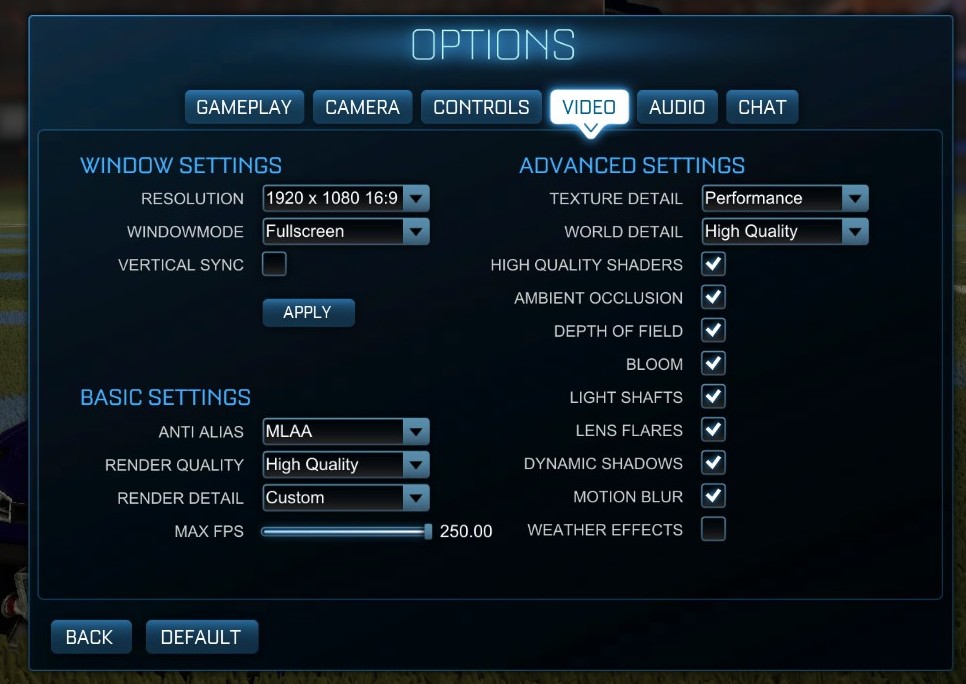








176 Comments
View All Comments
MTEK - Monday, July 24, 2017 - link
Random amusement: Sandy Bridge got 1st place in the Shadow of Mordor bench w/ a GTX 1060.shabby - Monday, July 24, 2017 - link
That's funny and sad at the same time unfortunately.mapesdhs - Monday, July 24, 2017 - link
S'why I love my 5GHz 2700K (daily system). And the other one (gaming PC). And the third (benchmarking rig), the two I've sold to companies, another built for a friend, another set aside to sell, another on a shelf awaiting setup... :D 5GHz every time. M4E, TRUE, one fan, 5 mins, done.GeorgeH - Monday, July 24, 2017 - link
Those decreased overclocking performance numbers aren't just red flags, they're blinding red flashing lights with the power of a thousand suns.Seriously, that should have been the entire article - this platform is a disaster if it loses performance under sustained load. That's not hyperbole, it's cold hard truth. Sustained load is part of what HEDT is about, and with X299 you're spending more money for significantly less performance?
I sincerely hope you're going to get to the bottom of this and not just shrug and let it slide away as a mystery. Hopefully it's just platform immaturity that gets ironed out, but at the present time I have absolutely no clue how you could recommend X299 in any way. Significantly less sustained performance is a do not pass go, do not collect $200, turn the car around, oh hell no, all caps showstopper.
deathBOB - Monday, July 24, 2017 - link
But they're big AVX workloads. We know heat and power get a bit crazy with the AVX, and at some point we should just step back and realize that overclocking may not be appropriate for these workloads.GeorgeH - Monday, July 24, 2017 - link
But other AVX workloads didn't have the issue.Until we know exactly what is going on and what will be required to fix it, I can't comprehend how anyone can regard X299, at least with the quad core CPUs, as anything but "Nope". Maybe a BIOS update will help, or tuning the overclock, but maybe it'll require new motherboard revisions or delidding the CPU. I'm sure it'll get fixed/understood at some point, but for now recommending this platform is really hard to accept as a good idea.
MrSpadge - Monday, July 24, 2017 - link
> But other AVX workloads didn't have the issue.Using a few of those instructions is different from hammering the CPU with them. Not sure what this software does, but this could easily explain it.
Icehawk - Monday, July 24, 2017 - link
I do a lot of Handbrake encoding to HEVC which will peg all cores on my O/C'd 3770, it uses AVX but obviously a much older version with less functionality, and I can have it going indefinitely without issue.I've looked at the 7800\7820 as an upgrade but if they cannot sustain performance with a reasonable cooling setup then there is no point. The KBL-X parts don't offer enough of a performance improvement to be worth the cost of the X299 mobo which also seem to be having teething problems.
Future proofing is laughable, let's say you bought a 7740x today with the thought of upgrading in two years to a higher core count proc - how likely is it that your motherboard and the new proc will have the same pinout? History says it ain't happening at Camp Intel.
At this point I'm giving a hard pass to this generation of Intel products and hope that v2 will fix these issues. By then AMD may have come close enough in ST performance where I would consider them again, I really want the best ST & MT performance I can get in the $350 CPU zone which has traditionally been the top i7. AMD's MT performance almost tempts me to just build an encoding box.
I loved my Athlon back in the day, anyone remember Golden Fingers? :D
mapesdhs - Monday, July 24, 2017 - link
Golden Fingers... I had to look that up, blimey! :DDrKlahn - Tuesday, July 25, 2017 - link
I recently went from a 4.6GHz 3770K to a 1700X @ 4GHz at home. I play some older games that don't thread well (WoW being one of them). The Ryzen is at least as fast or faster in those workloads. Run Handbrake or Sony Movie Studio and the Ryzen is MUCH faster. We use built 6 core 5820K stations at work for some users and have recently added Ryzen 1600 stations due to the tremendous cost savings. We have yet to run into any tangible difference between the two platforms.Intel does have a lead in ST, but tests like these emphasize it to the point it seems like a bigger advantage than it is in reality. The only time I could see the premium worth it is if you have a task that needs ST the majority of the time (or a program is simply very poorly optimized for Ryzen). Otherwise AMD is offering an extraordinary value and as you point out AM4 will at least be supported for 2 more spins.